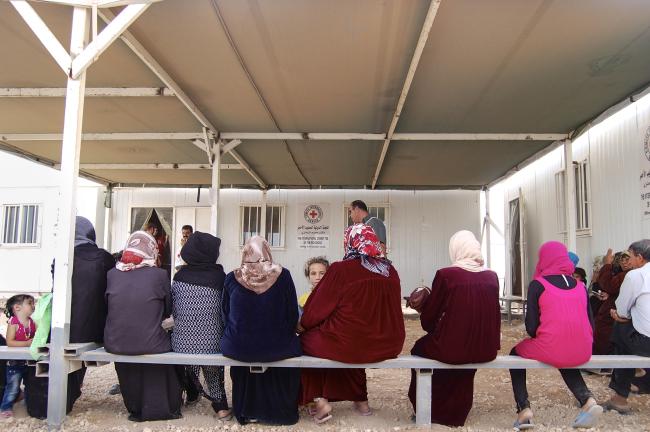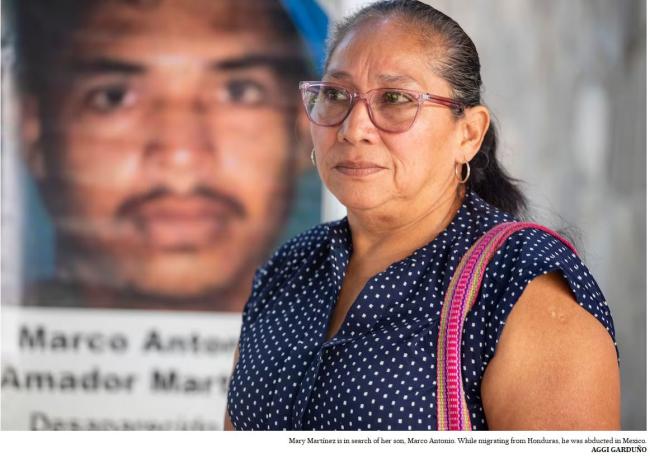Waiting for the disappeared as a form of resilience

By Simon Robins
ICRC/CTA Missing Persons Centre
Those of us who work with and support them understand that time – the length of their loved ones’ absence – is a defining element of the suffering endured by the families of missing people. Nevertheless, it is given almost no consideration in tackling the issue of missing people and supporting their families. And it plays no role in the legal frameworks that define missing and disappeared people: it makes no difference to the law whether someone has disappeared for one day or been missing for many decades. But to take this position is to ignore a basic aspect of the experience of missing peoples families: waiting – that is, waiting for truth, for justice and sometimes even for an official acknowledgement that the person in question is missing.
Forced waiting: An imposition on families
A recent academic paper by Özgür Sevgi Göral examines this experience of waiting, and explains how it is affected when the family in question becomes involved in a legal process, even when that process does not lead to a positive outcome. Göral’s narrative begins in Diyarbakir, a Kurdish-majority city in eastern Turkey, but it chimes with the experiences of missing people’s families’ in many other contexts. Göral describes how two men were taken from a public square by soldiers early one morning in 1993 and never seen again. What happened next, to the families of those two disappeared people, has happened far too often in numerous states. Göral argues that states deliberately weaponize time against dissidents – ‘enforced waiting ’ being an integral part of forced disappearance, which is itself a component of repressive violence.

Göral notes that “relatives of the disappeared are forced to wait by means of myriad daily forms of violence, endless futile legal procedures and redundant rejections”. The families of missing or disappeared people must endure various kinds of humiliation in their desperate quest for answers from authorities who are themselves implicated in the disappearance of their loved ones. This appears to be the case throughout the world.
Göral’s paper outlines three phases of waiting that relatives of the disappeared have to go through. She takes the case of the wife of one of the two disappeared men mentioned earlier to be representative. The first phase is characterized by a sense of urgency. During this phase, she waited to learn the fate and whereabouts of her husband. The second phase began after the first weeks of the disappearance and continued for one to two years: during this period, she demanded to know what exactly had happened to her husband. The third phase was characterized by her realization that – given what was known of the security forces’ methods – her husband was probably dead, which drove her to insist on knowing where his remains were while also preserving her memories of him. Throughout this period – the three phases described above – she raised her six children by herself, under extremely difficult conditions and dependent on the financial support of relatives and friends. Families regard their waiting as an act of loyalty to the disappeared; it also symbolizes their hopefulness and persistence.
The third phase of waiting, with regard to the two disappeared men, was interrupted in 2009 by the trial of a senior military officer who was charged with manslaughter in the case of one of the disappeared. Waiting then took a different form – waiting to give testimony – and loyalty to the disappeared was given a new context, as participation in the ongoing hearings became an ethical and political duty. All those accused were eventually acquitted, and the waiting became less focused and was centred, once again, on the need for truth and justice.
From passive waiting to activism
This loyalty to the disappeared however is not entirely passive. It is also an activist response to the violence of disappearance; it maintains memories and resistance and supports effective coping.
Göral emphasizes the value and usefulness of waiting: “It weaves together a site of anxiety, loyalty, hope and struggle that transcends the apathy of the legal space and constructs new forms of resilience.” Waiting is a dynamic process, consisting of different degrees of hopefulness, expectation and anxiety, and different degrees also of passivity and activity. More than this, waiting opens up space for the formation of new identities: being a ‘relative of the disappeared’ is an identity forged in waiting and serves as a platform for struggle. Göral’s paper seeks to show how time can be an ally of families and how it can be used to build solidarity and resistance that can support families psychosocially and also serve as weapons in the fight for truth and justice. Waiting may begin as imposition, but the families of the disappeared turn it into a process that includes different forms of activity and political mobilization. This can be seen in numerous contexts, where families come together to support one another and to demand that their needs be addressed: time creates bonds among those who share the experience of having a missing relative, and this solidarity is the basis for their activism.
Göral concludes by noting that the responses of the relatives of the disappeared enable the transformation of powerlessness into resilience and political mobilization. She describes these family members’ persistence in appealing to a legal regime that they do not believe in as part of “transformative waiting”, which represents a form of hopefulness that is essential for surviving their suffering.



